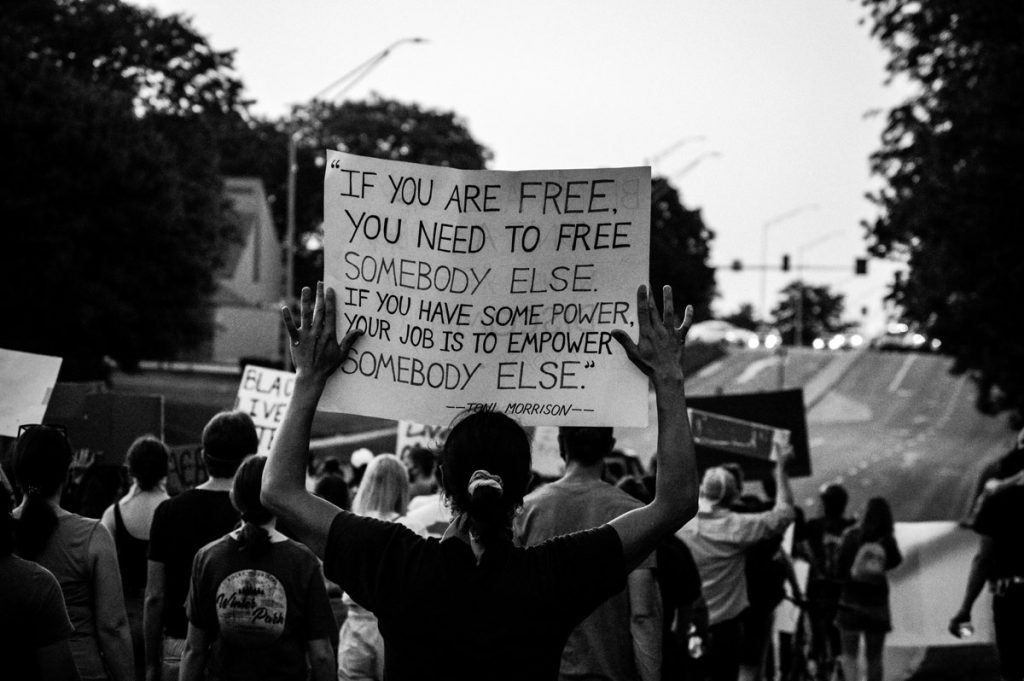Mental health and social justice are vital topics that significantly affect our well-being. The intersection of these two areas has gained increasing importance in recent years. Oppression, discrimination, and inequality can profoundly impact mental wellness. This article aims to examine the effects of oppression on mental health and emphasize the significance of comprehending and promoting mental wellness in social justice movements.
The Toll of Oppression on Mental Wellness
Oppression involves the use of power, authority, or force to systematically mistreat, exploit, or marginalize individuals or groups based on their identity, including their race, gender, sexual orientation, religion, or socioeconomic status. It results in the unjust treatment and denial of people’s rights, access to resources, and opportunities, perpetuating discrimination and marginalization.
Forms of Oppression
- Racism is a system of oppression based on the belief that certain races are superior to others. It can take many forms, including hate speech, racial profiling, and systemic inequalities.
- Sexism is a system of oppression that disadvantages individuals based on their gender. It can lead to gender discrimination, stereotypes, and barriers to equal opportunities.
- Homophobia is a system of oppression based on fear and hatred of LGBTQ+ individuals. It can lead to discrimination, microaggressions (indirect, subtle, or unintentional discrimination), and barriers to equal opportunities.
- Transphobia is a pervasive form of systemic oppression that stems from fear and hatred towards transgender individuals, resulting in various forms of discrimination, including misgendering and barriers to equal opportunities.
- Ableism is a form of systemic oppression that discriminates against individuals with disabilities. It can result in exclusion, lack of access to resources and opportunities, and mental and physical health issues.
- Ageism is a systemic form of discrimination that targets individuals based on their age, causing them to experience exclusion, limited access to resources and opportunities, and health-related concerns.
- Xenophobia is a type of systemic oppression that discriminates against individuals on the basis of their nationality, ethnicity, or perceived national origin, resulting in discrimination, exclusion, and adverse health outcomes.
- Religious oppression discriminates against individuals based on their religious beliefs or practices, leading to discriminatory attitudes and behaviors and systemic barriers that disadvantage them. Religious minorities in the US such as Muslims, Jews, or Sikhs commonly face denial of services or employment, harassment, and violence.
- Classism is a form of systemic oppression against individuals based on their social class or economic status. This leads to limited access to essential resources and opportunities such as housing, education, and healthcare, creating economic oppression. Such systemic oppression is fueled by discrimination based on financial resources or perceived social status, which results in significant disadvantages and restricted upward mobility.
- Linguistic oppression is a form of systemic oppression that discriminates against individuals based on their language and communication abilities. It can result in exclusion from education, employment, or social opportunities due to language or dialect.
- Political oppression is systemic discrimination against people based on their political beliefs, affiliations, or activities, resulting in restricted political freedoms, limited access to resources and opportunities, and adverse mental and physical health effects.
- Colonialism and imperialism are forms of systemic oppression that involve the domination and exploitation of one group of people by another, often resulting in displacement, poverty, loss of cultural identity, and mental and physical health issues.
Exploring the Impact of Oppression on Mental Health
Trauma
The impact of oppression on mental health is significant and wide-ranging. Oppression can cause stress and anxiety, depression, and trauma. Individuals who experience discrimination and marginalization may feel a lack of control over their lives, leading to feelings of hopelessness, powerlessness, and despair. This can manifest in emotional dysregulation, where individuals have difficulty managing their emotions and responding appropriately to stressful situations.
Oppression can also create a sense of social isolation, disconnection, and hypervigilance, which can further exacerbate mental health issues such as depression, anxiety, and post-traumatic stress disorder (PTSD). Trauma can have long-term effects on mental health, including symptoms like anxiety, depression, and PTSD, and ongoing oppression can contribute to the development of these symptoms over time. It is crucial to address the root causes of oppression and provide support and resources for those who may be struggling with their mental wellness as a result of oppression.
Substance abuse and addiction
Oppressive experiences can lead to substance abuse and addiction, resulting in feelings of despair, hopelessness, and disconnection from society. Discrimination and marginalization can prompt individuals to turn to drugs or alcohol to cope or self-medicate. Substance use can also be a way to rebel against oppressive societal norms that stigmatize certain identities or behaviors. However, addiction can worsen pre-existing mental health issues and cause additional health problems, leading to a harmful cycle.
Low self-esteem
The experience of oppression can contribute to low self-esteem, as individuals may internalize negative messages and feel less valuable or worthy than others. Chronic experiences of oppression can have a cumulative effect on self-esteem, potentially resulting in mental health issues such as anxiety and depression.
Negative body image
Oppression perpetuates harmful beauty standards and stereotypes, leading to a distorted self-perception and negative body image. This pressure to conform to societal beauty standards can result in shame, self-loathing, and body dysmorphia. Chronic experiences of oppression compound negative feelings and perceptions, exacerbating the effects on body image over time. Oppression can also cause eating disorders by perpetuating harmful beauty standards and societal expectations around weight and body shape.
Behavioral issues
Experiencing discrimination and marginalization can lead to behavioral issues as a result of the sense of powerlessness and frustration that accompanies oppression. This can manifest in harmful coping mechanisms such as aggression, impulsivity, and substance use. The stigmatization and criminalization of certain identities or behaviors can also result in oppositional or defiant behaviors as a form of rebellion against oppressive societal norms.
Suicidal ideation and attempts
Chronic experiences of oppression can increase the risk of suicidal ideation and attempts by creating feelings of hopelessness, helplessness, and despair. Oppression can lead individuals to believe that their situation is unchangeable, potentially resulting in suicidal thoughts as a means to escape their pain.
Self-harm
Oppressive experiences can lead to self-harm as a way to cope with emotional pain and distress. This can be due to a lack of control over one’s life, hopelessness, and shame caused by discrimination, marginalization, and other forms of oppression. Self-harm can provide a sense of control over one’s body or regulate intense emotions.
The Profound Impact of Historical and Ongoing Oppression on Mental Wellness
- Slavery, genocide, colonialism, and imperialism can lead to trauma, depression, anxiety, and substance abuse, particularly affecting Black and Indigenous communities.
- The transatlantic slave trade can cause generational trauma, depression, and anxiety in descendants of slaves.
- Ongoing systemic oppression based on marginalized identities can lead to microaggressions, discrimination, and stigma that contribute to mental health issues.
- Economic oppression can cause poverty, food insecurity, housing instability, and lack of access to healthcare, leading to mental health issues in low-income communities.
- Environmental racism can expose individuals to toxins and other environmental hazards, leading to physical and mental health issues.
- Political oppression, such as censorship and surveillance, can cause stress, anxiety, and trauma.
Advocacy for Mental Wellness in Social Justice Movements
Importance of advocating for mental wellness in social justice movements
Advocating for mental wellness in social justice movements is critical for various compelling reasons. Prioritizing mental wellness ensures that individuals engaged in social justice movements are healthy, motivated, and can make sustained contributions to the movement.
Additionally, advocating for mental wellness draws attention to the systemic issues that lead to mental health disparities and promotes action to address them. It also acknowledges the intersectionality of mental health issues with social justice issues such as racism, sexism, and homophobia, ensuring that individuals with diverse identities are included and represented in the movement.
Furthermore, prioritizing mental wellness reduces stigma associated with mental health issues, enabling individuals to seek support and access resources more easily. By prioritizing mental wellness, social justice movements can become sustainable, mitigating burnout and supporting the mental health of individuals involved in the movement.
Role of mental health professionals in social justice movements
Mental health professionals play a crucial role in supporting the mental wellness of activists and organizers involved in social justice movements. They can provide emotional and psychological support to those who may experience burnout, trauma, and stress related to their activism.
Mental health professionals can also help raise awareness and educate social justice activists on mental health issues, such as trauma, anxiety, depression, and self-care. They can also reduce the stigma of seeking mental health services and promote the importance of prioritizing mental wellness in social justice movements.
Moreover, mental health professionals can advocate for policy changes that address systemic issues that negatively impact mental wellness, such as poverty, inadequate access to mental health services, and discrimination. Finally, they can offer clinical services to individuals and communities impacted by oppression and social injustice, providing a safe and supportive space to address their mental health concerns.
The Bottom Line
The imperative of understanding the intersection of mental wellness and social justice cannot be overstated. As explored in this article, the impacts of oppression on mental health are wide-ranging. They can include negative body image, eating disorders, self-harm, emotional dysregulation, suicidal ideation, and behavioral issues. It is crucial to advocate for mental wellness in social justice movements and prioritize the mental health of activists and organizers to build a sustainable movement and create a better future for all.
About the Author: Sarah Smith is a 35-year-old, Los Angeles-based freelance writer and advocate for mental health. In her spare time, she enjoys hiking in nearby mountains, practicing yoga, and experimenting with new vegan recipes. Sarah is deeply committed to promoting equality and believes in the ability of writing to raise awareness and effect change. She has published extensively on mental health, trauma, and inequality, and she is committed to promoting mental health in all communities.
Photo by Kalea Morgan on Unsplash
Making mental health and substance use services available to all
Health inequities in the United States are reflected in differences in the average length of life, rates of disability, severity of illness, and access to treatment. Mental health equity will be achieved when all people have the opportunity to attain their full health potential.
rtor.org and Our Sponsor Laurel House, Inc. Celebrate Pride in June
On June 28, 1969, New York City police raided the Stonewall Inn, a gay nightclub in Greenwich Village, sparking a riot and six days of protests. This incident, known as the Stonewall Uprising, marks a turning point in the gay rights movement, now celebrated as Pride Month in June.
This Pride Month, www.rtor.org and Laurel House affirm their commitment to supporting members of the LGBTQ+ community in their quest for equity and justice, especially in their fight for accessible, safe, health, and mental health care.
www.rtor.org and Laurel House are committed to the advancement of racial equity and social justice, and to making mental health services available to all.
The opinions and views expressed in any guest blog post do not necessarily reflect those of www.rtor.org or its sponsor, Laurel House, Inc. The author and www.rtor.org have no affiliations with any products or services mentioned in the article or linked to therein. Guest Authors may have affiliations to products mentioned or linked to in their author bios.
Recommended for You
- The Truth about Relapse in Addiction Recovery - April 14, 2025
- The Power of Peer Support in Mental Health Recovery - April 10, 2025
- Artificial Intelligence in Anxiety Management: How AI Helps Users Cope with Anxiety Symptoms - April 3, 2025





